
All of the 40 Republic Services collection trucks in the RecycleSmart area now run on Compressed Natural Gas (CNG). It’s cleaner and greener than diesel—and it’s lighter than air!

The natural gas that many of us use to heat our homes or boil a pot of spaghetti on the stove comes from below ground where organic matter decomposed over millions of years, creating byproducts of water and methane gas. Now, our garbage trucks are using that natural gas for fuel instead of diesel. In engines, it’s 90% cleaner than burning diesel fuel. What’s left is just water and carbon dioxide. “And, engines running on CNG are about 90% quieter than diesel-powered engines,” says Paul Ginochio, Republic Services. “That really makes a difference in residential areas.”
CNG produces fewer emissions than any other fuel and contains significantly less pollutants than gasoline or diesel. It produces 20-30% fewer greenhouse gas emissions and 95% fewer tailpipe emissions than petroleum products. The gas is drawn from wells in the US and compressed to less than 1% of its volume. The CNG tanks are like scuba tanks or a fireman’s air supply tank, only larger. They’re on the top of the Republic trucks, providing similar power and range as diesel, at a much lower emission rate. The US has more than a 100-year supply of natural gas. Cleaner, quieter and abundant—that’s a win-win-win!
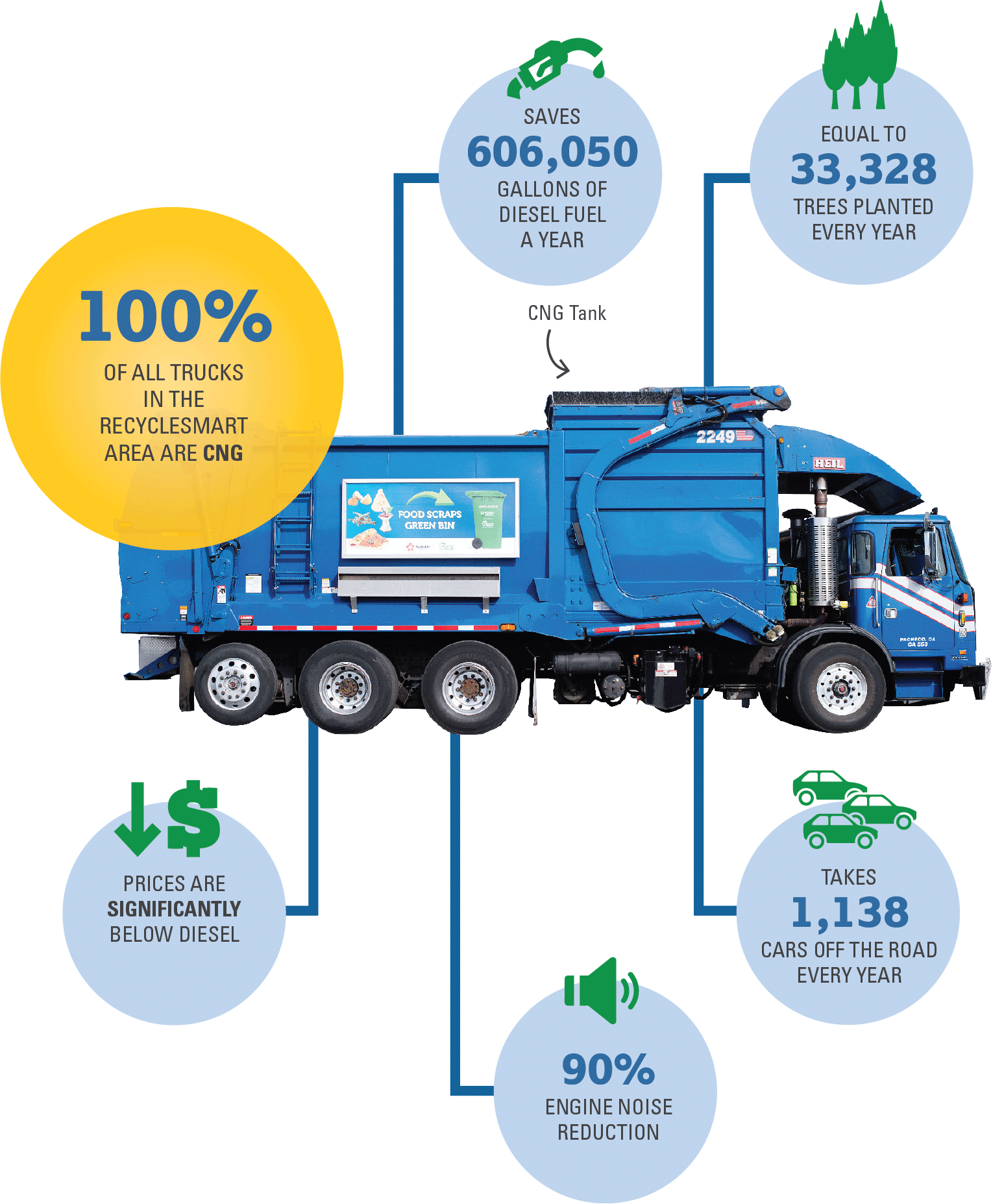
Follow the process of where your batteries go after you dispose of them through recycling.


Alkaline batteries make up about 95% of all household batteries. Other common types are lithium ion and the small batteries used in cameras, hearing aids and watches. All of them are hazardous waste. When batteries corrode in the landfill, toxic metals can leach into the ground, contaminating soil and underground water. That’s why it is against the law to throw them in your black landfill cart. But we’ll pick up all your batteries and ensure they’re properly recycled; just put them in a clear ziplock bag on top of the blue cart. (Or, consider using rechargeable batteries.)

Nope. They’re often contaminated with food and grease and can’t be reused as paper. They can go in your green organics cart.
Nope. Unfortunately all foam products should go in the black landfill cart; they are not easily recycled.
Nope. Clean bags can be recycled! Just bag-the-bags and put right into the blue recycling cart.
Nope. Food and grease can clog pipes and cause backups and sewer spills. Prime cloggers are cheese, gravy, salad dressing and meats. Plus, it takes a lot of resources and energy to remove all of the food waste at the water treatment plant. Place all of your food scraps in the green organics cart.
Nope. Just make sure they’re empty and fairly clean—use a spoon, spatula or napkin to clean out the container (and compost the napkin in your green organics cart).
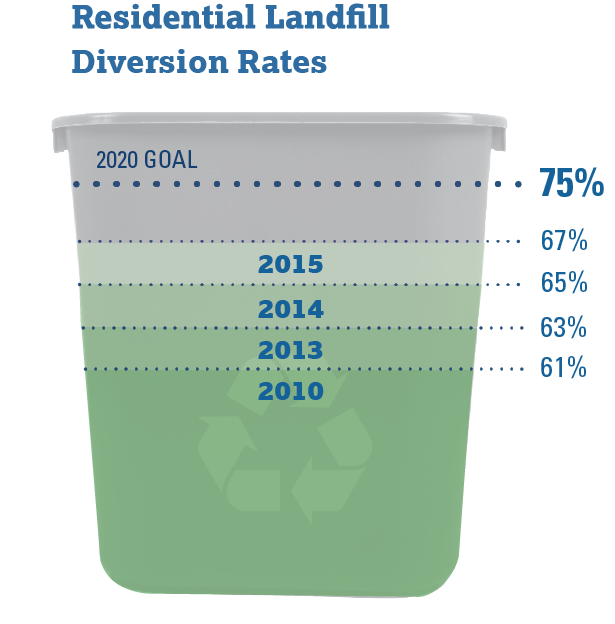

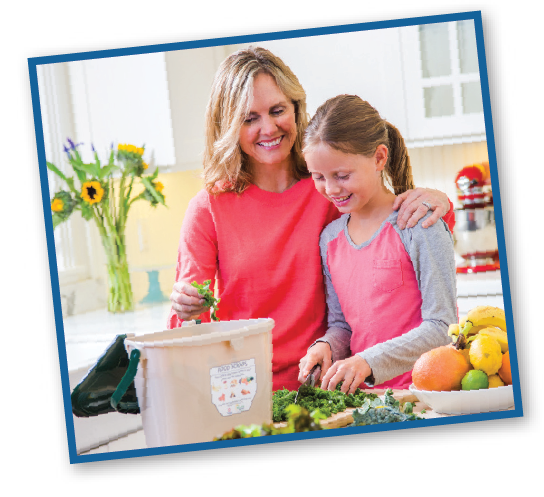
“We use most of our ‘waste’ organic matter to build nutrient-rich soil in the garden. I used to think it would make the kitchen smelly, but it doesn't. We also scrape other leftovers directly into the food scraps container and then toss it into the green cart with our weed debris."
Tina Neuhausel, Walnut Creek
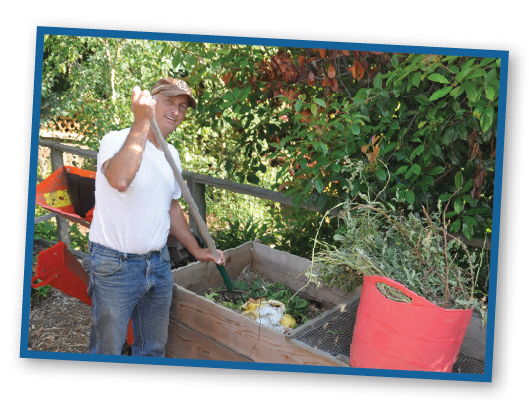
“We ‘double sort.’ We put veggie and fruit scraps in our container to use in our own backyard composting. Cooked leftovers like meats and bones get wrapped in newspaper and stored in the freezer until collection day, when we toss them in the green cart.”
Andy Scheck, Moraga
Sustainable Contra Costa has honored RecycleSmart with the 2016 Leadership in Sustainability Award for “Sustainable Resource Management.” The nonprofit group educates and inspires people to create and maintain sustainable communities. It cited our high-quality, cost-effective and comprehensive organics and food waste recycling programs.

RecycleSmart welcomes Cameron Tattle as a CivicSpark Fellow to our team. CivicSpark is a statewide Governor’s initiative to address climate change and increase recycling. RecycleSmart is the first solid waste authority to host a fellow.
Carts overflowing? Want a larger blue recycling or green organics cart?
You can increase the size of your cart from the standard 64 gallons up to 96 gallons at no additional cost.That’s supersizing in a good way! (Hint: The third digit on your cart tells you the size: 6=64 gallons and 9=96 gallons.)
You can also get a free 2-gallon food scraps container—then just collect your food scraps and dump them into your green organics cart!
Call Republic Services and your new cart(s) will arrive like magic: 925-685-4711.
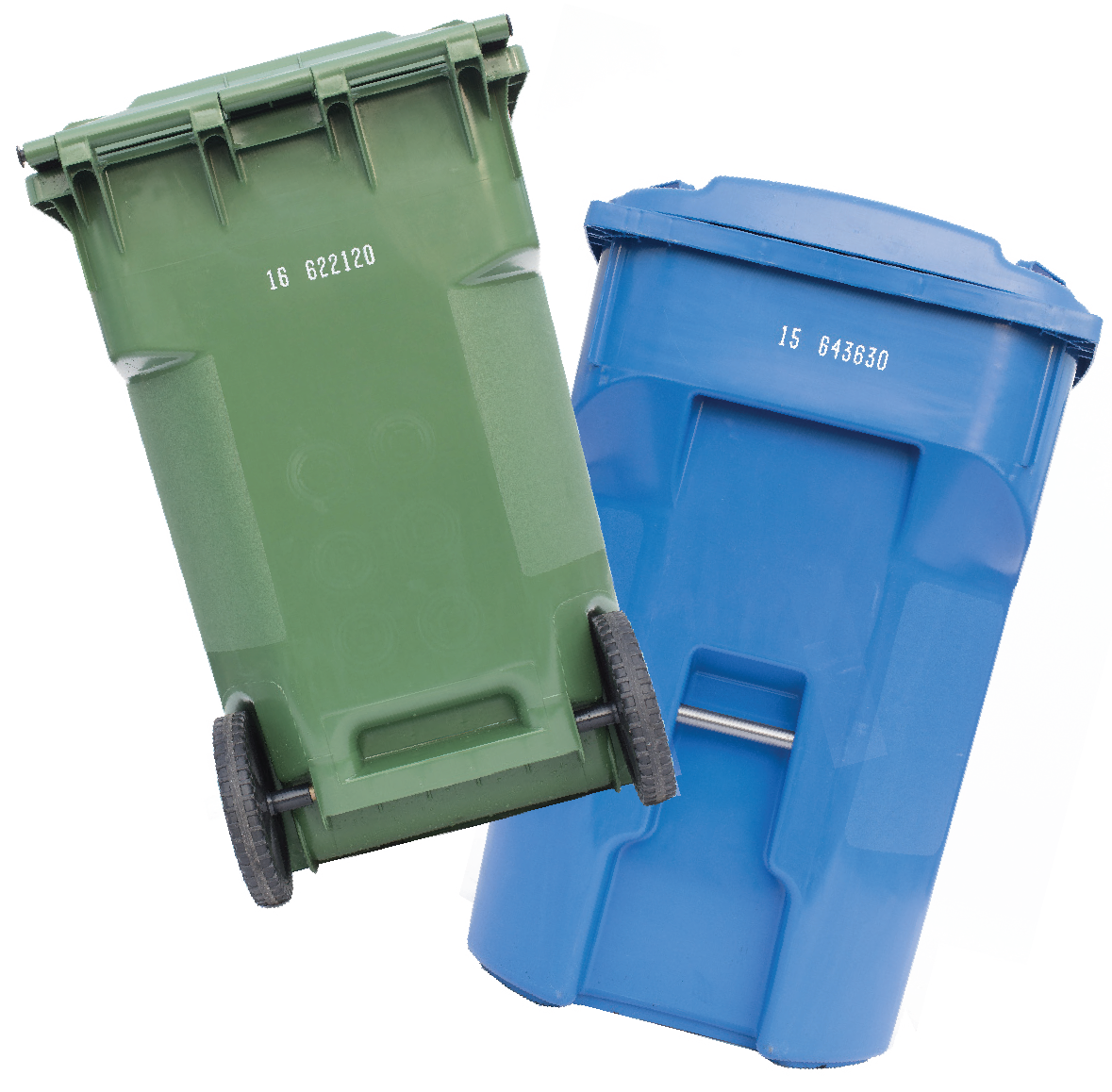
KID'S CORNER
Actually, you can rescue potato skins and apple peels before they go into the green organics cart. They’re not garbage at all—they’re tasty snacks! Here’s how to prepare them:

Put them in a bowl and drizzle a little olive oil on them.
Add some salt and pepper, and toss.
Heat the oven to 400ºF.
Spread them in a single layer on a baking sheet.
Roast about 5-6 minutes, stir, roast another 5-6 minutes (potatoes might need 5 more minutes).
Put them in a bowl and drizzle a little melted butter on them.
Add some sugar and cinnamon, and toss.
Heat the oven to 400ºF.
Spread them in a single layer on a baking sheet.
Roast about 5-6 minutes, stir, roast another 5-6 minutes.
Print out the image below and sort all the trash; or use our online interactive version!
